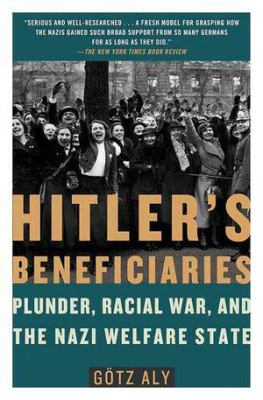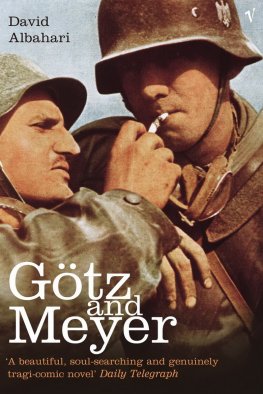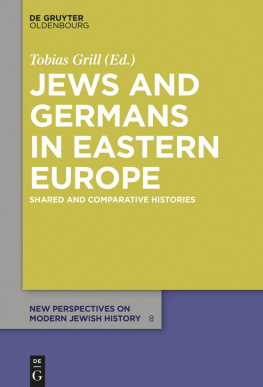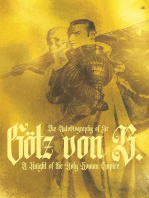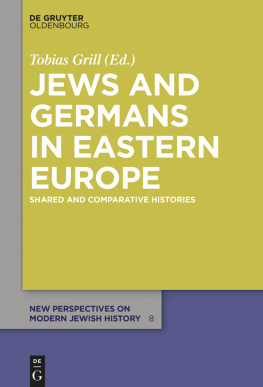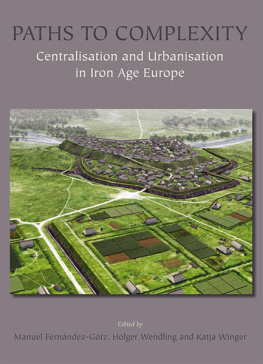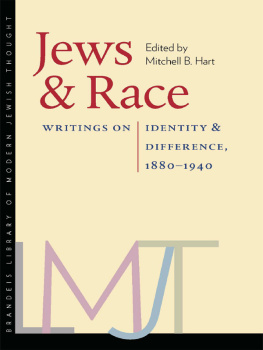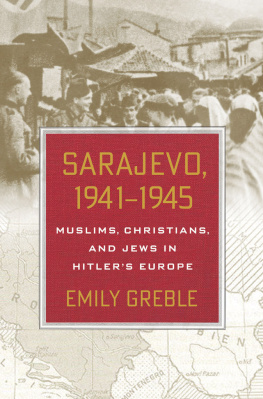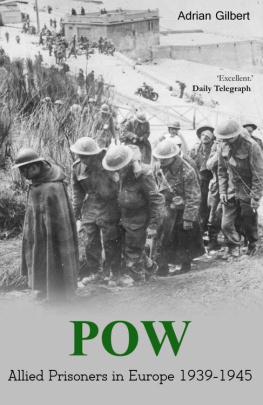Götz Aly - Europe Against the Jews, 1880-1945
Here you can read online Götz Aly - Europe Against the Jews, 1880-1945 full text of the book (entire story) in english for free. Download pdf and epub, get meaning, cover and reviews about this ebook. publisher: Henry Holt and Co., genre: Politics. Description of the work, (preface) as well as reviews are available. Best literature library LitArk.com created for fans of good reading and offers a wide selection of genres:
Romance novel
Science fiction
Adventure
Detective
Science
History
Home and family
Prose
Art
Politics
Computer
Non-fiction
Religion
Business
Children
Humor
Choose a favorite category and find really read worthwhile books. Enjoy immersion in the world of imagination, feel the emotions of the characters or learn something new for yourself, make an fascinating discovery.

Europe Against the Jews, 1880-1945: summary, description and annotation
We offer to read an annotation, description, summary or preface (depends on what the author of the book "Europe Against the Jews, 1880-1945" wrote himself). If you haven't found the necessary information about the book — write in the comments, we will try to find it.
Europe Against the Jews, 1880-1945 — read online for free the complete book (whole text) full work
Below is the text of the book, divided by pages. System saving the place of the last page read, allows you to conveniently read the book "Europe Against the Jews, 1880-1945" online for free, without having to search again every time where you left off. Put a bookmark, and you can go to the page where you finished reading at any time.
Font size:
Interval:
Bookmark:


The author and publisher have provided this e-book to you for your personal use only. You may not make this e-book publicly available in any way. Copyright infringement is against the law. If you believe the copy of this e-book you are reading infringes on the authors copyright, please notify the publisher at: us.macmillanusa.com/piracy.
More than two million Eastern European Jews emigrated to America between the early nineteenth century and 1914 in increasing waves, looking for security and better lives. Whereas Polish, Italian, Chinese, or German families tended to send out young men in advance, Jews often sold everything they had, packed up their entire families, and headed off into the unknown, never to return to their former countries. They were not just seeking fairer prospects; they were fleeing collective persecution. Israel Zangwill, the son of Jewish-Russian emigrants who left for Britain and the man who coined the phrase melting pot, described their situation. The Italian or Chinese [who emigrated to the US] secretly plans to come home again with the money hes made. But what home does the Jew have to return to? He has burned all his bridges. Often he was made to flee without a passport. He cannot return.
In the summer of 1907, the United States was rocked by an economic crisis. Within weeks, 300,000 Italian immigrants returned to their home country. Speaking to an audience in London that year, Zangwill asked them to imagine what would happen if 300,000 Jews came back to Europe.
Some thirty years later, Germany and Poland demonstrated exactly what would happen. In the summer of 1938, the Polish government in Warsaw issued regulations stripping Jews of their Polish citizenship if they had been living abroad for more than five years. In response, at the end of October, German police arrested 17,000 Polish Jews, brought them to the Polish border, and forced them across. Although Poland was their home country, they were not welcome. In the eyes of many, they were Jews and nothing but. For days, Polish and German border patrols herded the deportees back and forth. Finally, they were interned in hastily constructed, closely guarded camps on the Polish side. The largest camp, with space for more than eight thousand men, women, and children, was built near the Neu-Bentschen/Zbszy border crossing between Frankfurt an der Oder and Poznan. It remained in operation until the summer of 1939.
A deportee from Berlin, the violinist Mendel Max Karp, wrote of conditions there: The place is strictly cordoned off by police, and there are police checks at the train station. Only refugees over the age of sixty-five are allowed to travel further on into Poland. The rest of us are left to find our own way of escaping this cage, and since that is only possible with an entry visa to another country, we are desperately awaiting help from the outside. Karp, who had been born in 1892 in the Austrian village of Ruszelczyce, Galicia (which became part of Poland at the end of World War I), had family in Germany.
In mid-November, two weeks after Karp sent his letter, the Polish government cut food rations for the camp inmates. At the same time, it called on Washington, London, and the League of Nations in Geneva to make other countries admit the deportees who had been driven out of Germany. On what grounds? The Polish ambassador in London, Count Edward Raczyski, argued that although these people might still possess Polish passports, they had no other connections to Poland. A bit later, Raczyskis deputy, Count Jan Baliski-Jundzi, warned the British Foreign Office that while Poland had so far been able to tamp down actions against Jews, it could not do so forever. If the community of Western nations didnt help out by accepting the deportees, Poland would have only one way of solving the Jewish problempersecution.
Thanks to international intervention and agreements reached between Germany and Poland, Max Karp was granted permission to return to Berlin from the Zbszy camp on June 29, 1939although German authorities demanded that he leave the country for good within two months. He planned to emigrate to Shanghai, and his American relatives raised the money to pay for his passage. By the end of August, Karp had gathered everything he needed: an undated ticket paid for in dollars, identification papers full of official stamps and seals, and an extension of his residence permit granted by the Gestapo covering the time until he was able to depart. But it was too late. The Second World War began on September 1. On September 13, Berlin police took Karp into custody and interned him as a stateless Eastern European Jew in the Sachsenhausen concentration camp. There he was given the number 009060 and put in what was known as the small camp, together with other people in his situation. On January 27, 1940, he died or was killed. The exact circumstances of his death are unknown.
His death certificate was filled out by a Brandenburg city official named Otto Griep, who wrote that Karp had succumbed to the flu according to the written notification of the Sachsenhausen camp commandant. Sachsenhausen didnt yet have its own death registry. It also lacked a crematorium, so Karps body was cremated at the Baumschulenweg facility in Berlin. Karps aunt, Rachel Intrator, had his ashes buried at the Jewish Cemetery in the Weissensee district of Berlin in the grave of his mother, Anna Karp.
The story of Mendel Max Karps life and death embodies European hostility toward Jews in many respects. The German government persecuted him, deprived him of his livelihood as a musician, turned him into a door-to-door tinker, and forced him to the border. The Polish government stripped him of his citizenship and then refused to take him in. In the end, it was Germans and not Poles who murdered Karp, but the Polish government bore responsibility for lowering his chance of survival.
The deportations and murders of the Holocaust were the result of German initiative. Germans controlled the bureaucratic operations, detaining people, sending them to ghettos, and confiscating their possessions. Germans developed the technology of the genocide. They organized the mass executions and death camps. They unleashed the violence against the Jews in the states that were occupied by Nazi Germany or allied with it. There is no question that the ultimate culpability rests with the Hitler regime.
Nonetheless, the genocide could not have been carried out solely by those who initiated it. When we examine the daily practices of persecution in various countries, we cannot fail to note the ease with which German occupiers were able to enlist local nationalist, national-socialist, and anti-Semitic movements to serve their ends. Without at least passive support in those countries, without the help of administrators, police, state officials, and thousands of non-German helpers who all played a role in the atrocities, Hitlers monstrous project could not have been realized with such breathless speed. There is no way we can comprehend the pace and extent of the Holocaust if we restrict our focus to the German centers of command.
On learning of Hitlers plan to wage war on the Soviet Union, Romanian dictator Ion Antonescu, for example, saw an opportunity to rid his country of its Jewish population. Romania needs to be liberated from this entire colony of bloodsuckers who have drained the life essence from the people, he remarked. The international situation is favorable, and we cant afford to miss the moment. Like many others, Antonescu wanted to exploit the exceptional historical situation that Germany had brought about, the collapse of moral and legal standards in so many parts of Europe.
Font size:
Interval:
Bookmark:
Similar books «Europe Against the Jews, 1880-1945»
Look at similar books to Europe Against the Jews, 1880-1945. We have selected literature similar in name and meaning in the hope of providing readers with more options to find new, interesting, not yet read works.
Discussion, reviews of the book Europe Against the Jews, 1880-1945 and just readers' own opinions. Leave your comments, write what you think about the work, its meaning or the main characters. Specify what exactly you liked and what you didn't like, and why you think so.

